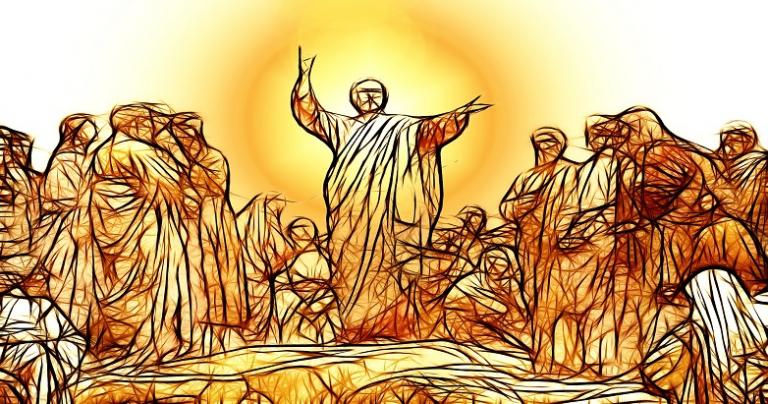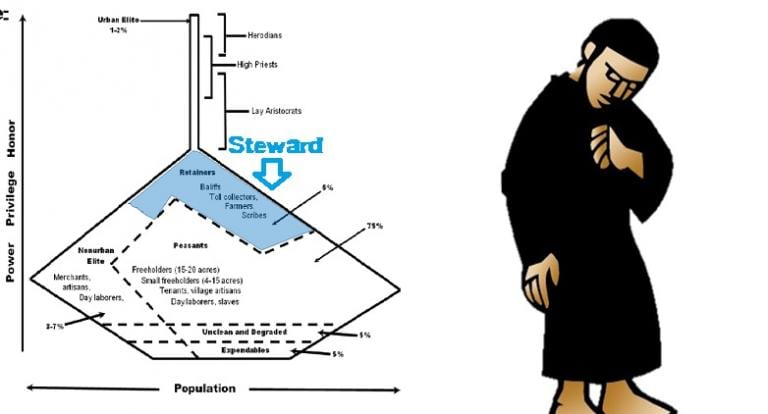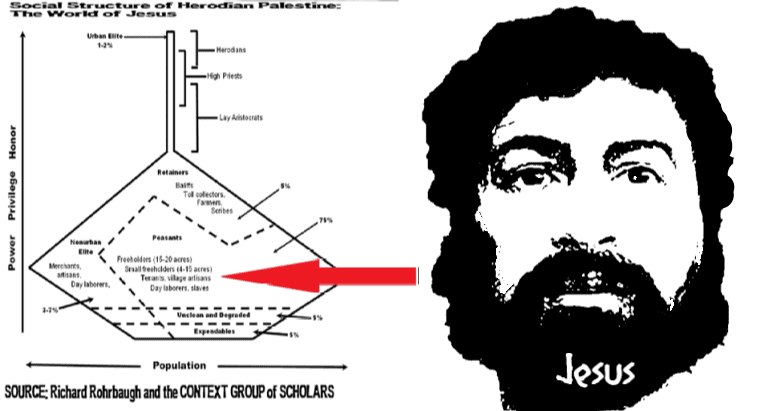
Righteousness is the topic of the Matthean Jesus’ “Sermon on the Mount,” and in this Sunday’s Gospel, it must surpass that of the hated Scribes.
Righteousness plays a huge role throughout the document we call “Matthew.” The call of righteousness for all disciples of Jesus takes center stage in the Sermon on the Mount (Matthew 5:1—7:29). This Sunday’s Gospel (Matthew 5:17-37) dives into the famous sermon on ideal behavior for the disciples of Jesus.
Setting up the Sermon on Righteousness
The author and evangelist we call “Matthew” provides his audience with a typical summary statement of everything Jesus did during his first tour of the Galilee in Matthew 4:23. The Matthean Jesus performed three activities. He taught. He preached or proclaimed theocracy. And he healed.
In chapters 5—7, “Matthew” presents what Jesus taught. Then in chapters 8—9, he describes his healings. After that, in chapter 10, Jesus authorizes the core members of his coalition or political faction, the Twelve (10:1) so they may perform the same works themselves ethnocentrically, that is, exclusively to Israelites (Matthew 10:6).
The Synoptic Tradition remembers that the prepaschal Jesus was not a universalist, but rather an ethnocentric particularist. He was fiercely ingroup-oriented—the Theocracy or Kingdom, as originally understood and proclaimed in the Jesus Movement, was for Israelites only.
This shouldn’t be surprising given Jesus’ command in Matthew 10:5-6, or his typical and fundamental Mediterranean understanding that humanity is divided into two groupings, us and them (Luke 11:23). Accordingly, the Synoptics refer to special information unavailable to outsiders (Mark 4:11-12; Matthew 13:11; Luke 8:10), but readily provided to insiders close to Jesus. The Incarnation is messy, folks!
A Word Concerning Righteous Healings
The NABRE and other translations speak of Jesus “curing every disease.” This is a nonsense translation, ethnocentric to our culture’s biomedical way of looking at illness. Jesus healed. Did he cure people? Maybe. But do we have any way of knowing, scientifically, the biomedical conditions which Jesus treated? Where are the “before and after” markers (blood tests, X-rays, scans, etc.)? Are we certain whether any of these biological/psychological maladies recurred? Biblical authors provide none of this information. They know illness, not disease. So they present illness and how the illness gets managed by the folk healer Jesus and his clients.
Learn the difference between curing and healing is crucial for Bible readers. Find out more here.
In Righteousness, Jesus’ Honor Grows
So reading Matthew 4:24-25, it looks as if Jesus’ tour of the Galilee gained a positive reaction from the people. Because of this, “Matthew” provides yet another summary statement. This time he focuses on Jesus’ growing fame. This is acquired honor, the reward of virtue or result of noble behavior. Honor wouldn’t be honor without public acknowledgment.
All three Synoptic Gospels show concern for the honor of Jesus. But “Matthew” and “Luke” outdo “Mark” in this regard. As we’ve seen, their manufactured genealogies, fictitious honor-pedigrees, elevate Jesus’ birth-honor to pretentious heights. Continually, they spin the honor Jesus gains likewise pretentiously whether through titles, winning arguments, by his confounding inquirers, and more.
Jesus’ public reputation is critical for rhetorical strategies of both “Matthew” and “Luke.” These are definitely not 21st century Western biographers, folks. Rather they are writing for audiences educated socialized and enculturated by Mediterranean values. These sophisticated audience know the social rules. They expect justification for the claims both the “Matthean” and “Lukan” narratives make, and the public acknowledgment of Jesus’ reputation is essential. So they must spin.
Did you notice here that “Matthew” mentions Jesus’ growing fame in Syria (Matthew 4:24)? That’s probably a wink telling us where the Matthean Jesus group is located in the 80s CE rather than reporting something factual that happened back in the 20s. As scholar John Meier says, in the first century, Jesus wasn’t a blip on the radar screen. Other would-be messiahs were far more famous. Jesus was not a celebrity!
The Imaginary Mountain of the Sermon on Righteousness
The Matthean Jesus provides a new basis for honor in his version of the Beatitudes (Matthew 5:1-12). You can read about that here. The beatitudes redefine authentic honorable behavior demanded of the Matthean Jesus group.
Unlike “Luke” who uses the common source of sermonic material differently depicting his Jesus teaching on a level plain (Luke 6:17-49), “Matthew” has his Jesus on an unnamed imaginary mountain. That’s right!—don’t waste your money on tour-guides from apartheid states that dump sewage onto starving people’s fields and shoot children in the head for sport. It’s not Mt. Eremos or any other literal mountain or hill. This mountain is in alternate reality.
Also don’t confuse your blood-stained vacation trip as a pilgrimage. Should one actually happen, a pilgrimage takes costly grace, more than what is afforded from a Jesusey vacation trip. And in any case, despite what people want to sell you, there is no literal mountain location where this sermon took place. “Matthew”—who wasn’t writing for American tourists or popular speakers getting kickbacks as tour guides—features five imaginary mountain scenes.
If you would like to go to the Mountain of “Matthew,” you can! Just look into the panhuman experience of altered states of consciousness.
Salty Righteousness
Then the Matthean Jesus speaks about fiery salt, the earthen-oven (cf. Job 28:5; Psalm 12:7), and light (Matthew 5:13-16). This was last Sunday’s Gospel reading, and you can learn about it here and here. It keeps getting people fiery mad—good! That’s what being salty like Jesus does!
This is followed by the Matthean Jesus announcing the theme of his Sermon on the Mount. It is the demand for his followers’ righteousness (5:17—7:27) to surpass that of the scribes (5:21-28) and the Pharisees (6:1-18). And what is righteousness? John Pilch explains that it means proper and honorable interpersonal relationships with other followers of Jesus (“brothers”) and with the God of Israel.
The Righteousness of Light & the Wickedness of Darkness
The followers of Jesus are called “the light of the world” (Matthew 5:14). In the world of the Bible, darkness is never the absence of light. It is not the lack of something; rather, it is something in and of itself. Just as the interior of the daytime sky vaults, seen overhead by our biblical ancestors in faith, were imagined to emit daylight, so those sky vaults at nighttime were thought to emit “nightdark.” This is a radically different way of looking at light and darkness than we 21st century Westerners understand!
So for any first century Mediterranean person, including members of the Matthean Jesus group, darkness was an objectively present reality. Light was understood as the presence of light and darkness was understood as the presence of dark. According to this understanding, light is capable of pushing darkness out, but so too darkness can push out light (Matthew 6:22)! Comprehending this is pivotal to understanding the Matthean Jesus—he draws sharp lines between himself and his enemies while warning his followers.
The Righteousness of Biblical Cosmologies
Then we get a fascinating insight with verse 18—
Matthew 5:18
Amen, I say to you, until sky vault and earth pass away, not the smallest letter or the smallest part of a letter will pass from the law, until all things have taken place.
Lots of Christians talk about the end of the world. Some imagine the whole planet earth being destroyed somehow and then recreated. Really these ideas are not to be found in the Bible. Biblical peoples didn’t believe in that sort of thing. After all, it was their patron, the God of Israel (i.e., the highest God), who had created the sky vaults (wrongly translated as “heaven”) and the earth. How can something pass away that God created? Biblical peoples like Jesus and “Matthew” figured this was impossible. Thus, the Scriptures of Israel taught, “the earth remains forever” (Ecclesiastes 1:4).
So “until sky vault and earth pass away” means “never.” The Matthean Jesus is swearing an oath. It means “even if the sky vaults and earth pass away (and we all know that ain’t ever gonna happen!), then, a fortiori, even more nothing will pass away from the law until everything is accomplished.”
Only Righteousness May Enter Theocracy
As far as Theocracy goes, there is no entry given to Israelites only so poorly righteous as the scribes and the (Ben Zakkaist?) Pharisees (Matthew 5:20). Please understand that many of the attitudes expressed within the Gospel called “Matthew” reflect times waaaaaay after the prepaschal Jesus, like those well into the 80s CE. Historically Jesus probably was a Pharisee. These stories have been twisted throughout Church history as fuel for antisemitic rants and poison.
The whole outline of the Sermon on the Mount is outlined in verse 20. The Matthean Jesus deals with the righteousness of the scribes (Matthew 5:21-48). Then, he deals with that of the Pharisees (Matthew 6:1-18). Ultimately he addresses the Matthean Jesus Group’s righteousness in terms of the three symbolic body zones: eyes/heart (6:19—7:6), mouth/ears (7:7-11), and hands/feet (7:12-27).
Failures at Righteousness: the Scribes
Although there were a scant number of writers like “Luke” who belonged to the elite class, scribes were mostly part of the retainer class which made up about five percent of the population of Herodian Palestine. Part of the two percent that could read and write, these men, hated by Galilean villagers, were the lawyers of ancient Israel. Although they came from the cities, often these bureaucrats and functionaries could be found in peasant villages throughout the Galilee, manipulating things for the benefits of the Herodians and the Lay Aristocracy.

Scholar Richard Rohrbaugh explains that within the peasant villages of Galilee scribes were required because almost no one could there read or write. In Jesus’ day, perhaps a couple lower scribes lived in Capernaum. These men handled all writing, managed every contract, kept every record, and mastered all documents. All transactions passed through these scribes.
Although they lived and labored within the villages, the scribe was a hated outsider. The peasants were bound to their contracts, but being illiterate meant they couldn’t read them! Therefore scribes were feared and hated. And the villagers knew these outsiders were loyal to the greedy urban elites in Jerusalem.
The Synoptic tradition is rich with stories of Jesus interacting with these retainers. There are reports that Jesus even had followers from this class. These included Jairus’ household, lowly toll collectors such as Levi and even chief toll collectors like Zacchaeus, and centurions who almost undoubtedly were Israelites. But most of the retainer class and scribes were enemies of Jesus, most especially the lay aristocracy to which the Pharisees belonged.
No Righteousness of Scribes to Scripture
The scribes were the experts at Scripture. Their specialty was the Torah which they summarized in commandment-lists (Matthew 22:34-40).
When we explore the “ten” commandments, we should be aware of their original historical purpose—to prevent blood feud that could lead to the extinction of Israel. In this honor-based Mediterranean society, everything the Decalogue prohibits demands retaliation. Because he often publically humiliated his opponents explains partly why Jesus was killed.
By these “antitheses,” the Matthean Jesus provides an escape from impasses that demand violent satisfaction of offended honor. None of the strategies Jesus offers involve inward, psychological healing familiar and expected by American Christians. Here, the moral sanctions here are situation-based—nothing here is introspective.

The Matthean Jesus attacks the scribes in this Sunday’s Gospel. He criticizes them for their reinterpretation of the commandments. The Matthean Jesus group is given an honorable exit to “game over” situations resulting from escalating blood feud. The community’s survival depends on following Jesus’ own interpretation of the commandments.
Righteousness & Murder (Matthew 5:21-26).
In the agonistic culture of the Middle East, words can hurt worse than sticks and stones. Words can even wipe out villages! So the Matthean Jesus bans anger and insults because these can mutate into murder and from there a feud that engulfs everyone. Again, neither Jesus nor “Matthew” has anything psychological or introspective in mind concerning the subject of “anger.” The key is public displays of anger.
The Matthean Jesus forbids insults, deadly in the Middle Eastern world. He sanctions the Matthean Jesus group from ever calling someone a “fool” (Matthew 5:22). But don’t forget that Jesus was master of the insult. In typical Middle Eastern fashion he seems beautifully inconsistent, as when he insultingly labels scribes and Pharisees “fools!” in Matthew 23:17.
But the Matthean Jesus is deadly serious about nipping blood feuds in the bud. To him, even Temple worship takes a back seat to canceling the honor debt and reconciling with one’s “brother” (Matthew 5:23-24).
Neither Jesus nor “Matthew” were universalists. When the Matthean Jesus says “brother” (5:22) he means a fellow disciple of Jesus, a fellow member of the Jesus group. We can understand by this that “Matthew” considers his Jesus group as a surrogate family, a fictive kinship network because “brother” normally was used for kin. Carefully reading the Sermon on the Mount shows that as “Matthew” develops concerns for the “brother” it becomes evident that this teaching is meant exclusively for the Jesus group and their ingroup interpersonal relations. It is not meant for outsiders!
Righteousness & Biblical Adultery (Matthew 5:27-30).
In the Biblical world, adultery is different than in our highly and much later evolved Catechisms. Here “adultery” is a shame game. It means dishonoring a fellow male inside the Jesus group by having sexual relations with his wife. In the Biblical world, passion was not the primary motivator for adultery, but rather the deliberate seeking your brother’s humiliation was. In the Bible a woman could be caught in the act of adultery, but she could not commit it. Only social equals have hope for shaming another.
The adulter’s ability to cross the family boundaries of his “brother” with impunity is what produces the dishonor. The family is dishonored—their reputation is destroyed unless fast action takes place. Adultery was almost impossible to hide from the public in this world without privacy which is strictly gender-divided. Therefore, biblical adultery demands satisfaction that can escalate to murder, blood feud, and the extinction of the Jesus group.
To prevent blood feud that would engulf and wipe out Israel, Deuteronomy 22:22-24 demanded that both woman and man caught in adultery would be put to death. Often the male culprit would escape while the father and brothers of the woman would murder her to remove the stain of shame from their house. If the wronged husband does not want to be forever branded a cuckold, he must expose his wife’s shame. If he doesn’t slay the offending male, his manhood is forever in doubt.
The Matthean Jesus’ solution? Inside the Jesus group, forget about ever challenging your “brother” via adultery. Don’t even start down that road. Otherwise the Jesus group will be doomed.
Tearing Out the Right Eye in Righteousness
“Tearing out” your right eye refers to suffering dishonor.
1 Samuel 11:2
But Nahash the Ammonite replied, “This is my condition for making a treaty with you: I will gouge out the right eye of every man, and thus bring shame on all Israel.”
Zechariah 11:17
Ah! my worthless shepherd
who forsakes the flock!
May the sword fall upon his arm
and upon his right eye;
His arm will surely wither,
and his right eye surely go blind!
In other words, because of threat of blood feud, Jesus group males are to suffer shame for the benefit of peace within the community rather than retaliating with adultery or some other shaming action. There is nothing introspective going on here and Jesus is not prescribing mortifications.
The “right hand” refers to purposeful action, in this case, adultery which dishonors another man. In the Bible, hand-feet are a symbolic body zone that relates to purposeful activity. Looking is what eyes do. In the Bible, the eyes and heart are united and refer to emotion-fused thought.
Righteousness & Deadly Divorce (Matthew 5:31-32)
Like adultery, divorce can also disrupt the Matthean Jesus group and spell its doom from resulting blood feud. To understand “divorce” here you first need to understand “marriage.” In the ancient world, marriage is not between partners but the joining of families. It was the pooling of honor of two families joined for political and economic reasons. Hence biblical divorce spells certain blood feud between the split families—this is intolerable to the Matthean Jesus group. Therefore no divorce!
How does a Jesus group male cause his divorced wife “to commit adultery”? It is because he is, in effect, pimping her out for sexual unions with other males—bringing great dishonor on his family, requiring violent bloodshed. And should a Jesus group male marry a divorced woman, he would be to commit adultery,” thereby dishonoring her previous husband and family. The language is hyperbolic and used to warn against certain blood feud that engulf the Jesus group.
The ideal marriage partner in the Biblical world is your patrilateral first cousin. To divorce therefore would destroy villages of struggling peasants. The Matthean Jesus’ solution? “Lump it. The risk of blood feud is too great. The Jesus group must be whole.”
As seen in the video just above, many Christians, in total ignorance to their original contexts, have really abused Scriptural passages like these. Tragically, people have remained their entire miserable lives in unworkable, abusive relationships because they think they were fulfilling the will of God. Context, context, context!
Righteousness & Ingroup Lying (Matthew 5:33-37).
Speaking about context, Gospel readers need to grasp that the context of this section is selling. In the world of the Gospels, sellers ruled the marketplace. No third-parties were around insuring safety and honesty! How could buyers know that merchants—despised by all in the ancient world—and other sellers were being fair and honest? By having these men swear the oath, thereby placing them under the curse. Swearing involved calling the God of Israel to witness the veracity of a claim.
So first century sellers ensured the quality of their products via a set of phrases that would indirectly call God to witness. He would swear “by sky vault,” or “by my beard,” or “by the earth,” or “on my life,” or “by my head,” or “by Jerusalem,” and so forth. But God was not mentioned explicitly, only indirectly—and buyers would explode in rage. Conflict would escalate. Blood feud would follow.
See if God were asked to witness to crappy wares being sold as excellence to duped customers would constitute taking God’s name in vain. To fail to mention God’s name in swearing was interpreted as subterfuge. There’s no guarantee what the buyer was purchasing was in fact good.
The Matthean Jesus’ solution? For all market transactions involving Jesus group members, the “brothers” must be honest and direct. There can be no selling anything of poor quality or obfuscating anything to your fellow Jesus group members. The yes must be yes, and the no must be no.
Understanding Matthean Righteousness
Understand that these interpretations of the Matthean Jesus apply exclusively to his ingroup, the Matthean Jesus group, and their interpersonal relations. Pilch explains that if everyone throughout the Mediterranean world were to behave this way, the whole honor and shame society would be destroyed. In real life, there is no “one size fits all” morality rule book of marching orders. Sorry, fundamentalists!
Also please understand that neither Jesus nor “Matthew” is rejecting the Mediterranean core values of honor and shame and its resulting social system. Sorry late-comer theologians, but Jesus was not counter-cultural!
Neither Jesus nor “Matthew” is counter-culturally calling into question honor and shame by these Matthean antitheses and strategies. Rather what is being redefined is the quality of actions that should be deemed worthy of honor. This provides a new assessment of things which leads to a reversal of what is truly worthy or valuable.
But honor remains intact—the pattern for claiming worth and the public recognition of that claim remain intact—to both Jesus and the Matthean Jesus group. There is no other social system beside honor and shame, and therefore, what is being questioned is the manner by which the honor system works together with how it feeds blood feuds. So Jesus and “Matthew” are counter-structural, not counter-cultural—still committed to honor and shame, they seek to make human relationships within it kinder.
A lot to chew on this Sunday, huh? More with the Sermon on the Mount, soon…











